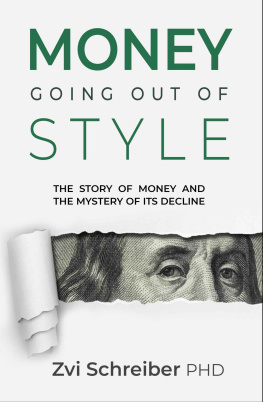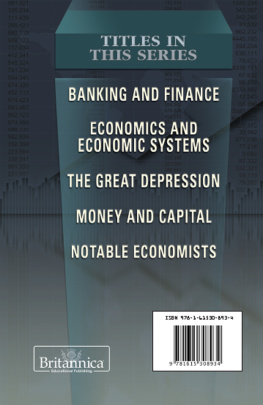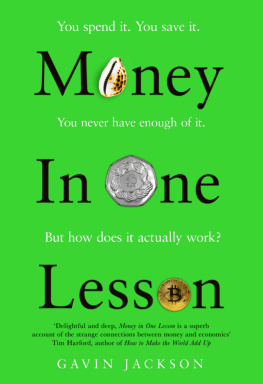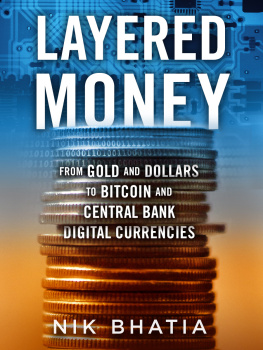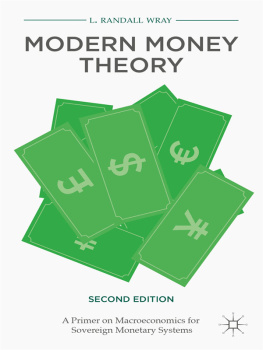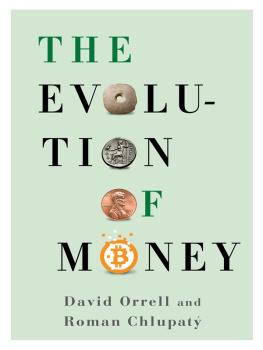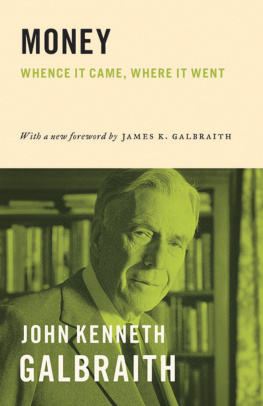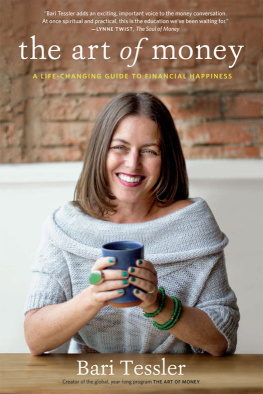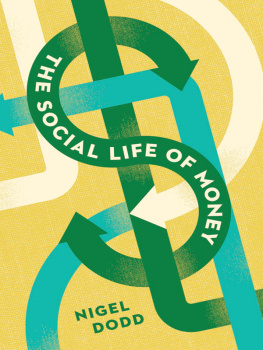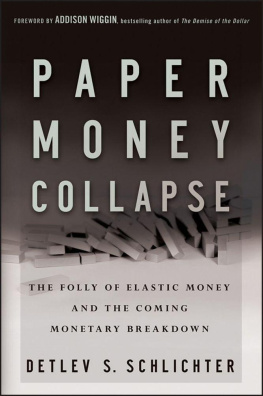ALL RIGHTS RESERVED. This book contains material protected under International and U.S. Federal Copyright Laws and Treaties. Any unauthorized reprint or use of this material is prohibited. No part of this book may be reproduced or transmitted in any form or by any means, electronic or mechanical, including photocopying, recording, or by any information storage and retrieval system without express written permission from the author / publisher.
Introduction
Far out in the uncharted backwaters of the unfashionable end of the Western Spiral arm of the Galaxy lies a little blue-green planet whose ape-descended forms were unhappy for pretty much of the time. Many solutions were suggested for this problem, most concerned with the movements of small green pieces of paper, which is odd because it wasn't the small green pieces of paper that were unhappy.
Douglas Adams, Hitchhikers Guide to the Galaxy
What are those small pieces of paper? What does a $10 bill or the two-tone 2 coin actually represent? What does the statement emailed to me every month by my bank mean? And why do I attach such importance to the number on its bottom line?
I have long had a vague intuition that stuff is real, and money is not. Stuff is my shorthand term for goods and services, including, where context allows, assets such as land, homes, and tools; in other words, everything you can consume, utilize, or experience.
At most, I believed that money is a shorthand way of keeping track of stuff and who owes stuff to whom. If money is really a way of keeping track of stuff owed, and since there is a balance between those who owe and those who are owed stuff, shouldnt the total value of money be zero?
This book is my attempt to clarify my own thoughts about how the economy actually works, and the role of money in the economy. My original motivation for thinking about an island tribe, which gradually develops commerce and money, was a desire to gain a better understanding of the daily news, financial activities, such as using a bank, and periodic financial turmoil, such as the 2008 crisis and the recession triggered by Covid-19. I hope my readers will find this approach to understanding the economy as enlightening as I did.
As I recreated the fundamentals of economics by way of a simple story, I found that many of my intuitions were confirmedthat money is essentially a shorthand way of tracking stuff, and that, in some senses, the total value of money in the world is zero. But it all depends on exactly what you mean by money, which turns out to be rather more complicated than I had expected.
This story of economics puts money in its rightful place: secondary to stuff . And the book is not expensive, which really means that you wont have to give up too much other stuff to own it!
Embarking on my journey to better understand money, the first thing I discovered, very much to my surprise, was that the modern concept of money is actually younger than me! I say this to emphasize how young modern money is.
When I was born in 1969, each U.S. dollar represented 1.1 grams (or 1/35 of a troy ounce) of physical gold, sitting in the basement of the Federal Reserve Bank in Manhattan, or in Fort Knox, Kentucky. I was born in England, and the British pound, like most major currencies, was at that time pegged to the U.S. dollar, at exactly $2.40.
As a two-year-old child, I could have taken a 50-pence coin (half a British pound), with its controversial seven-sided shape ( heptagonal , apparently), and I could have exchanged it for exactly $1.20. If I could have somehow reached Manhattan, $0.30 would have bought me a ride on the subway to 33 Liberty Street, and I would still have had $0.90 left to exchange at the Fed for exactly 1 gram of pure bullion gold.
As a two-year-old, I might not have known what to do with a gram of gold, but at least I could have held it in my hand, felt the cold metal, and admired its yellowish gleam. And even as a toddler, this little exercise would have helped me understand what a 50-pence coin meant: it was a token that could be exchanged for one subway ride plus a tiny nugget of yellowish metal.
By my third birthday, everything had changed. One morning in August 1971, President Nixon decided that he didnt fancy exchanging dollars for gold anymore. This was called the Nixon Shock because Richard Nixon didnt consult me in advance of the announcement. Nor, for that matter, did he consult any of the world leaders whose currencies were pegged to the dollar.
Soon afterwards, the UK decided that if the dollar wasnt backed by gold, it no longer cared to link the pound to the dollar. Almost overnight, money became nebulous. True, there have been other times in history when the convertibility of money to gold has been suspended, but only as a temporary measure.
Would people still trust and desire money when it no longer had any guaranteed underlying value? President Nixon soon received positive confirmation that they would, when the Watergate burglars blackmailed him. This new type of money was clearly still desirable.
Although money retained its allure even without the backing of gold, its value did become less stable. The dollar price of that NYC subway ride has increased tenfold since Nixons time, and the British pound is worth about half as many dollars as it was then. Then again, borders have been opening, and 50 pence, when exchanged for yuan, will still buy multiple rides on the subway in Beijing.
On a positive note, thanks to Nixon, money, and the economy it drives, has become a source of great confusionand therefore an interesting subject for a short book published around the half-century anniversary of the Nixon Shock.
While researching money, I learned a lot of things which I aim to share by way of a story. Firstly, I learned that fiat (besides being an acronym for Fabbrica Italiana di Automobili Torino , the Italian car) also means a decree, and that modern money is actually fiat money because it has no intrinsic value other than by government decree and social convention. I learned that most money is created by commercial banks, not by governments, and I started to worry that bank money might not be a positive force in the world.
I learned that cash and checking account balances are two very different things; that economists often pretend that they understand money and the economy a lot better than they do; that the Fed and other central bankers seem to claim that they can control the economy rather better than they can. Even if they knew how the economy worked in the twentieth century, its all changed in the last two decades. I learned that the U.S., Europe, and China have chosen three distinct solutions to the same central trilemma of international finance. I learned that trilemma is a word.
Every day on the news we hear politicians discuss interest rates, government deficits, government debt, and tax policy. Never has monetary policy been more confusing than during the Covid-19 pandemic, during which the Fed printed close to two trillion dollars of brand-new money.

